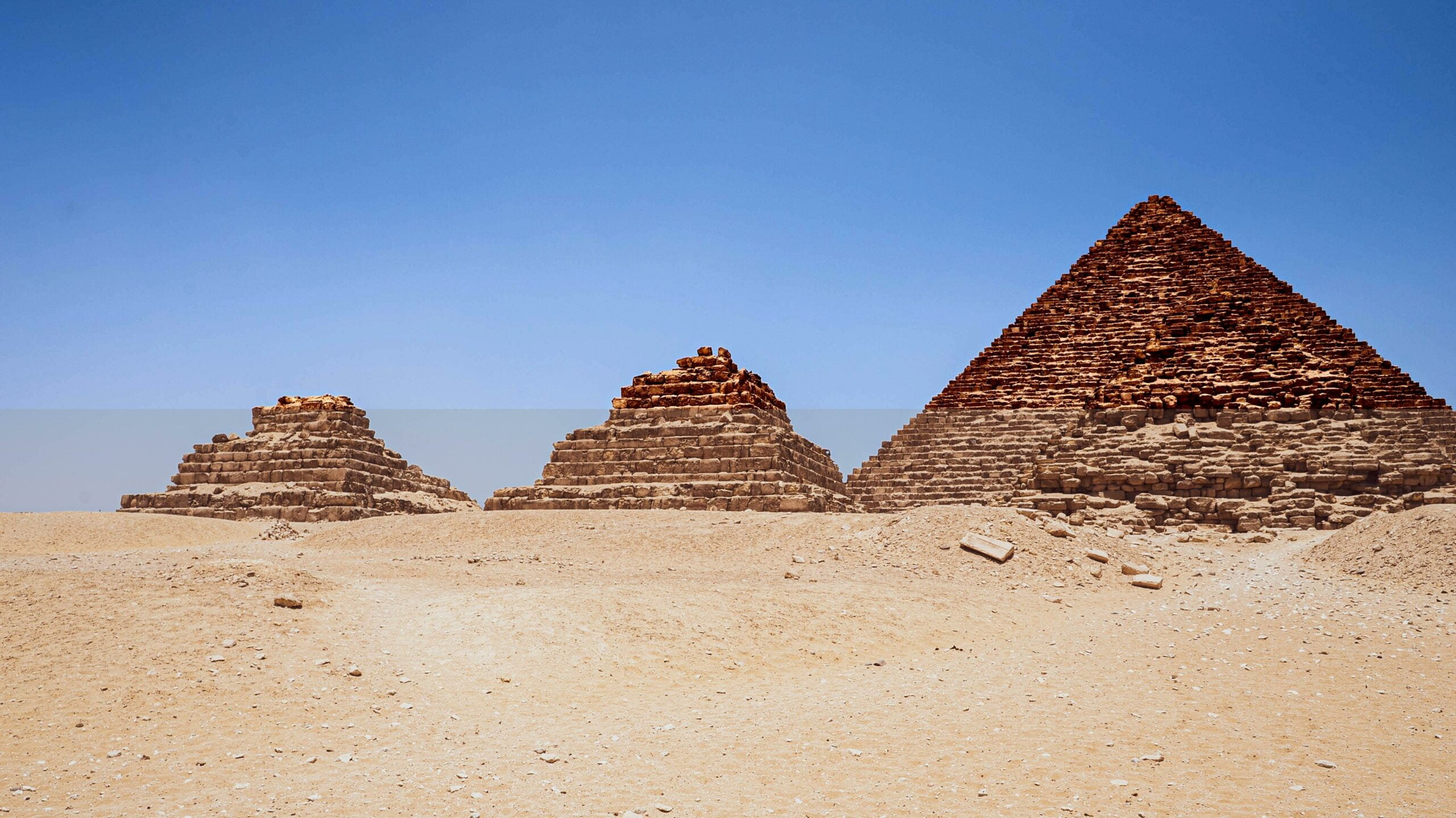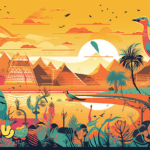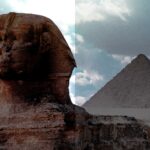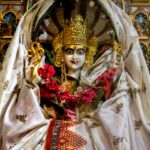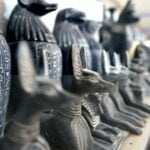The ancient Egyptian civilization is a treasure trove of fascinating myths and legends that continue to captivate people to this day. Within this enigmatic world, the names of famous Egyptian gods hold profound significance and reveal deep insights into the beliefs and culture of this ancient civilization. In this article, we will embark on a captivating journey, delving into the realm of Egyptian deities and exploring the intriguing and revered names that have captured the imagination of scholars and enthusiasts for centuries.
Famous Egyptian Gods Names
In the fascinating and enigmatic world of ancient Egyptian mythology, the gods played a central role in the lives of the people for over 3,000 years. With a pantheon consisting of over 2,000 deities, each with their unique characteristics and significance, it’s no wonder that the study of Egyptian gods has captured the imagination of scholars and enthusiasts alike.
Ra, the sun god, stands at the forefront of the Egyptian deities. Renowned for his role in the creation of the universe, Ra’s radiant power illuminates the sky and brings life to the world. But what other famous Egyptian gods names beckon our attention?
Let us journey into the mesmerizing realm of Egyptian mythology and explore the intriguing characters that shaped their cosmology.
Apep, the embodiment of chaos and the eternal adversary of Ra, represented the primal forces of disorder and destruction. Imagine a serpent coiled in darkness, forever locked in a relentless battle with the sun god to maintain cosmic balance.
Aten, symbolizing the solar disk, held a unique place in history as the singular supreme deity during the reign of Pharaoh Akhenaten. This monotheistic concept challenged the traditional beliefs and set a precedent for religious transformations to come.
Sekhmet commands attention with her fierce lioness form, reflecting her association with destruction, healing, and protection. In the mythology of the creation of the universe, Sekhmet emerges from the raging eye of Ra to vanquish his enemies and restore order.
Set, the god of chaos, embodies the untamed forces of the desert and embodies the eternal struggle between opposing powers. His heated rivalry with his brother Osiris casts a shadow over the myth of Osiris, a tale of betrayal and resurrection that touches the hearts of mortals across the centuries.
Osiris, the god of the afterlife and fertility, personifies the cycle of life, death, and resurrection. His tragic tale embodies the eternal struggle between good and evil, and his legacy lives on through the rituals and beliefs surrounding death and the journey to the afterlife.
Isis and Nephthys, sisters and consorts to Osiris, add depth and complexity to the myth of Osiris. Isis, the goddess of magic and fertility, utilizes her powers to restore her husband’s life and become the mother of Horus, the god of the sky and protector of the pharaohs. Nephthys, on the other hand, embodies mourning and serves as a guardian in the realm of the dead.
In the judgement of the Egyptian dead, the gods Anubis, Thoth, and Ammit play significant roles. Anubis, the jackal-headed god, guides and protects the souls of the deceased on their journey through the underworld. Thoth, the ibis-headed god, records the deeds of the deceased and serves as a judge in the afterlife. Ammit, the devourer of souls, waits in the Hall of Ma’at, ready to devour the hearts of those unworthy of eternal bliss.
Beyond these renowned deities, there are numerous other gods that hold immense importance in the ancient Egyptian pantheon. Khepri, the scarab-headed god, represents the rising sun and the cycle of life. Amun, associated with fertility and creation, merged with the sun god Ra to become Amun-Ra, the supreme god of the New Kingdom period. Ptah, the god of creation and craftsmanship, wields his creative power to shape the world and fashion the gods and mortals alike. Taweret, the goddess of childbirth and fertility, protects mothers and children on their journey towards new life. And Sobek, the crocodile god, symbolizes the ferocious and dangerous powers of the Nile River.
The world of Egyptian gods names is a captivating tapestry of myths and legends, each character imbued with their unique qualities, roles, and stories. Exploring their names not only grants us insight into their divine domains but also offers a glimpse into the beliefs and values held by the ancient Egyptians.
As we unravel the mysteries surrounding these famous Egyptian gods names, we immerse ourselves in a mesmerizing world where the divine and mortal realms intertwine. Let the stories of Ra, Apep, Aten, Sekhmet, Set, Osiris, Isis, Nephthys, Horus, Anubis, Thoth, Ammit, Khepri, Amun, Ptah, Taweret, and Sobek ignite our curiosity and remind us of the profound complexities of the human psyche and our eternal quest for meaning.
“Step into the world of Egyptian mythology, where the names of gods resonate with the echoes of time and the secrets of a civilization that flourished on the banks of the Nile.”
Egyptian mythology is full of captivating stories and legends that have fascinated people for centuries. From the curse of the pharaohs to the enigmatic Sphinx, there’s no shortage of intriguing tales to explore. But if you’re looking for a deeper dive into the world of ancient Egypt, you won’t want to miss out on some of the most famous Egyptian myths. These timeless stories, filled with gods and goddesses, heroes and creatures, will transport you to a world where anything is possible. So why not delve into the enchanting realm of Egyptian mythology and uncover the secrets of the infamous gods and goddesses? Click here to discover some of the most famous Egyptian myths: famous egyptian myths.
Top 10 Egyptian Gods and Goddesses
[youtube v=”e2cMS2SuWm0″]
Ra – The Supreme Solar Deity
In Egyptian mythology, Ra is revered as the primary god who played a central role in the creation of the universe. Depicted with the head of a falcon, Ra symbolizes the power of the sun and its life-giving energy. As the ruler of the heavens, he provided light, warmth, and guidance to the ancient Egyptians. “It’s not built on the scale of men, it’s built on the scale of gods,” Ra is the ultimate embodiment of divinity.
Apep – The Eternal Adversary
Apep, also known as Apophis, represents chaos and is the eternal adversary of Ra. Often depicted as a colossal serpent, Apep sought to challenge the order and harmony established by Ra. The Egyptians believed that Apep lurked in the depths of the underworld, waiting to disrupt the daily cycle of the sun’s journey. “It’s a guide to immortality,” Apep’s relentless struggle against Ra testifies to the eternal battle between chaos and order.
Aten – The Singular Supreme Deity
During the reign of Pharaoh Akhenaten, Aten became the singular supreme deity, challenging the traditional beliefs of polytheism. Aten represented the sun disk, radiating beams of light that reached and sustained all life on Earth. With the pharaoh acting as the intermediary between Aten and humanity, the worship of Aten symbolized the divine presence in the mortal realm. The concept of Aten underscores the Pharaoh’s divine right to rule.
Sekhmet – The Fierce Lioness
Sekhmet embodies the duality of destruction and healing. Portrayed as a fierce lioness, she symbolizes the raw power of both chaos and protection. Sekhmet is invoked in times of war to unleash destruction upon enemies, but she is also called upon for healing and protection, particularly against disease and plagues. Her presence in Egyptian mythology highlights the Egyptians’ recognition and reverence for the relentless power of nature.
Set – The God of Chaos
Set, also known as Seth, represents the untamed forces of the desert and is synonymous with chaos. Set is often associated with violence and cunning, as he dismembered his own brother Osiris in a fit of jealousy. Despite these negative associations, Set played a vital role in maintaining balance in the Egyptian pantheon, complementing Horus, the god of the arable land, by ruling over the Egyptian deserts. Set’s complex character illustrates the delicate interplay between order and chaos.
Osiris – The God of Life and Afterlife
Osiris is the god of the afterlife, resurrection, and fertility. As the beloved king and ruler of the lands made bountiful by the Nile, Osiris’s story revolves around his death and subsequent resurrection. His dismembered body was reassembled by his wife and sister, Isis, giving birth to their divine son Horus. Osiris became the god of the dead, guiding Pharaohs through the challenges and spells of the afterlife. He also symbolizes the agricultural cycle, from death to rebirth, and brought an end to the practice of cannibalism, introducing agriculture to the people. “All are welcome to the afterlife, this is my legacy,” Osiris’s role as the judge and guide to the Egyptian dead is a testament to the importance of life, death, and resurrection in ancient Egypt.
Isis and Nephthys – The Protector and Mourner
Isis, the sister and wife of Osiris, represents the throne itself and plays an integral role in Egyptian mythology. As the mother of Horus, she encapsulates the maternal nurturing aspect, symbolizing the connection between life and death. Isis’s tears for her murdered husband Osiris were believed to cause the flooding of the Nile, ensuring the continuation of life in Egypt. Her sister Nephthys, as the supporting mourner, completes the trinity of divine feminine powers. The myth of Isis and Nephthys establishes the importance of the feminine principle in ancient Egyptian beliefs.
Anubis – The Guardian of the Dead
Anubis, often depicted with the head of a jackal or a dog, holds significant responsibility in the judgment of the Egyptian dead. With the ultimate authority to determine whether the souls of the departed could proceed to the underworld, Anubis weighed their hearts against the feather of truth, Ma’at. This judgment determined the fate of the deceased in the afterlife. Anubis is closely associated with the embalming and mummification process, ensuring the preservation and transition of the deceased to their eternal fate. “That’s a jackal’s head, he is Anubis, the Egyptian guardian and protector of the dead.”
Thoth – The Mediator and Keeper of Knowledge
Thoth, characterized by either an Ibis or a baboon head, plays a multifaceted role in Egyptian mythology. Originally a moon god, Thoth later became known as the designer of the universe itself. He mediated between good and evil, employing education and wisdom to keep the balance in Egyptian society. Thoth is credited with the invention of writing, inspiring the remarkable Egyptian art that still captivates the world today. “I contain all the wisdom in the universe.”
Amun-Ra – The Defining Presence
Amun-Ra, also known as Amon-Ra, refers to the merged deity resulting from the combination of Amun and Ra. Amun, initially considered the hidden one, and Ra, the sun god, symbolize creativity and the divine nature of kingship. As the defining presence of Egyptian gods and goddesses, Amun-Ra held great significance in the lives of the ancient Egyptians. Worshipped as the king of gods, he was believed to provide personal meaning and a sense of calm to their daily existence. “He is and always will be the defining presence of Egyptian gods and goddesses.”
Note: The table below provides a summary of the Egyptian gods and goddesses mentioned in this article.
|God/Goddess|Description|
|-|-|
|Ra|The supreme solar deity and creator of the universe.|
|Apep|The embodiment of chaos and adversary of Ra.|
|Aten|The singular supreme deity during Akhenaten’s reign.|
|Sekhmet|The fierce lioness goddess associated with destruction and healing.|
|Set|The god of chaos and the untamed forces of the desert.|
|Osiris|The god of life, death, and resurrection.|
|Isis and Nephthys|Sisters who played crucial roles in the myth of Osiris.|
|Anubis|The guardian and protector of the dead, overseeing judgment.|
|Thoth|The mediator between good and evil and the keeper of knowledge.|
|Amun-Ra|The defining god of Egyptian religion, symbolizing creativity and kingship.|
In conclusion, the gods and goddesses of ancient Egypt represent diverse aspects of life, death, and the eternal struggle between order and chaos. These deities provided Egyptians with a spiritual framework and a connection to the cosmic forces that governed their existence. From Ra’s supreme power to Osiris’s role as the guide to the afterlife, each deity contributed to the rich tapestry of Egyptian mythology and left an indelible mark on history. Remember, “It’s not built on the scale of men, it’s built on the scale of gods.”
FAQ
Question 1
What is the significance of Egyptian gods in ancient Egyptian society?
Answer 1
Egyptian gods played a crucial role in the daily lives of ancient Egyptians for over 3,000 years. These deities were believed to govern various aspects of nature, society, and the afterlife, and were worshipped through rituals, offerings, and temples. Their influence extended from agricultural abundance and fertility to protection, justice, and the balance of cosmic forces.
Question 2
How many deities were there in the Egyptian pantheon?
Answer 2
The Egyptian pantheon consisted of over 2,000 deities. Each god or goddess represented a unique domain or aspect of life, such as the sun, the Nile River, love, war, wisdom, or fertility. This extensive pantheon reflects the diverse and complex beliefs of ancient Egyptians.
Question 3
Who are some well-known Egyptian gods?
Answer 3
Some famous Egyptian gods include Ra, Apep, Aten, Sekhmet, Set, Osiris, Isis, Nephthys, Horus, Anubis, Thoth, Ammit, Khepri, Amun, Ptah, Taweret, and Sobek. These gods played significant roles in Egyptian mythology and were revered by the ancient Egyptians.
Question 4
What were the roles of the gods in Egyptian mythology?
Answer 4
The gods played various roles in Egyptian mythology. Ra, Aten, Apep, and Sekhmet were involved in the creation of the Universe. Set, Osiris, Isis, Nephthys, and Horus were central figures in the myth of Osiris, which revolved around the concepts of resurrection and the afterlife. Anubis, Thoth, and Ammit played roles in the judgment of the Egyptian dead. Other important gods like Khepri, Amun, Ptah, Taweret, and Sobek had their unique realms of influence.
Question 5
Where can I find more information about Egyptian gods?
Answer 5
For more information about Egyptian gods, you can visit the websites egyptian-history.com, worldhistory.org, and egypttoursportal.com. These resources provide a deeper understanding of the fascinating world of ancient Egyptian mythology and the names of its famous gods.
- Discover the Borough of Frenchtown, NJ: A Delaware River Town Blending History, Art & Nature - November 22, 2024
- Discover Clarks Grove, MN: A Small Town with a Big Heart - November 22, 2024
- Califon Borough, NJ: A Small Town with a Big Heart (and Rich History) - November 22, 2024
